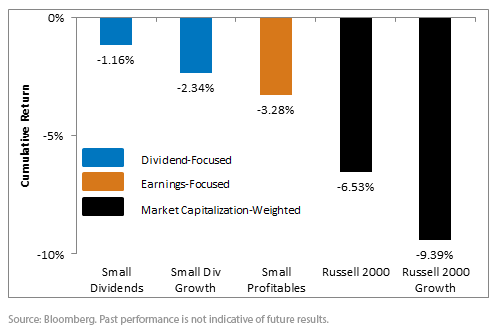Momentum Stocks Falter in 2014


 • Common Thread—Avoiding Speculative Names: What we saw across the brief Index descriptions above was that each WisdomTree Index requires something of its small-cap constituents. In each case, the “story stocks” that may not have actually made any money would have been excluded. The Russell 2000 Index—the broadest shown—would tend to include all small caps. The Russell 2000 Growth Index, as we mentioned earlier, would focus on the growth segment of the small-cap market, a segment that can be prone to higher valuations as well as speculative companies.
• Small Dividends Leads the Way: For those concerned about the prospects of small-cap stocks in the U.S., we believe that Small Dividends deserves particular focus. The focus solely on dividend payers and the broad diversification combine to form what we’d categorize as WisdomTree’s most defensive way to maintain small-cap equity exposure. Small Div Growth and Small Profitables would both creep more toward the growth side of the style box compared to Small Dividends.
Conclusion: All Small Cap Indexes Are NOT Created Equal
After 2013, a year where many segments of the U.S. equity markets performed particularly well, we believe that attentiveness to risk mitigation has become more important, especially in small-cap stocks. While we wrote about potential pockets of value within small caps earlier this year, here we emphasize Index methodologies, and those that purposefully avoid the more speculative companies can be beneficial. One may never fully eliminate the risk of investing in small-cap stocks, but we believe that a few simple rules have the potential to make a noticeable difference—especially during periods where markets become a bit choppy.
1Measures of quality refer to three-year average return on equity (ROE) and three-year average return on assets (ROA)
• Common Thread—Avoiding Speculative Names: What we saw across the brief Index descriptions above was that each WisdomTree Index requires something of its small-cap constituents. In each case, the “story stocks” that may not have actually made any money would have been excluded. The Russell 2000 Index—the broadest shown—would tend to include all small caps. The Russell 2000 Growth Index, as we mentioned earlier, would focus on the growth segment of the small-cap market, a segment that can be prone to higher valuations as well as speculative companies.
• Small Dividends Leads the Way: For those concerned about the prospects of small-cap stocks in the U.S., we believe that Small Dividends deserves particular focus. The focus solely on dividend payers and the broad diversification combine to form what we’d categorize as WisdomTree’s most defensive way to maintain small-cap equity exposure. Small Div Growth and Small Profitables would both creep more toward the growth side of the style box compared to Small Dividends.
Conclusion: All Small Cap Indexes Are NOT Created Equal
After 2013, a year where many segments of the U.S. equity markets performed particularly well, we believe that attentiveness to risk mitigation has become more important, especially in small-cap stocks. While we wrote about potential pockets of value within small caps earlier this year, here we emphasize Index methodologies, and those that purposefully avoid the more speculative companies can be beneficial. One may never fully eliminate the risk of investing in small-cap stocks, but we believe that a few simple rules have the potential to make a noticeable difference—especially during periods where markets become a bit choppy.
1Measures of quality refer to three-year average return on equity (ROE) and three-year average return on assets (ROA) Important Risks Related to this Article
Dividends are not guaranteed, and a company’s future ability to pay dividends may be limited. A company currently paying dividends may cease paying dividends at any time. Investments focusing on certain sectors and/or smaller companies increase their vulnerability to any single economic or regulatory development.

Christopher Gannatti began at WisdomTree as a Research Analyst in December 2010, working directly with Jeremy Schwartz, CFA®, Director of Research. In January of 2014, he was promoted to Associate Director of Research where he was responsible to lead different groups of analysts and strategists within the broader Research team at WisdomTree. In February of 2018, Christopher was promoted to Head of Research, Europe, where he was based out of WisdomTree’s London office and was responsible for the full WisdomTree research effort within the European market, as well as supporting the UCITs platform globally. In November 2021, Christopher was promoted to Global Head of Research, now responsible for numerous communications on investment strategy globally, particularly in the thematic equity space. Christopher came to WisdomTree from Lord Abbett, where he worked for four and a half years as a Regional Consultant. He received his MBA in Quantitative Finance, Accounting, and Economics from NYU’s Stern School of Business in 2010, and he received his bachelor’s degree from Colgate University in Economics in 2006. Christopher is a holder of the Chartered Financial Analyst Designation.

